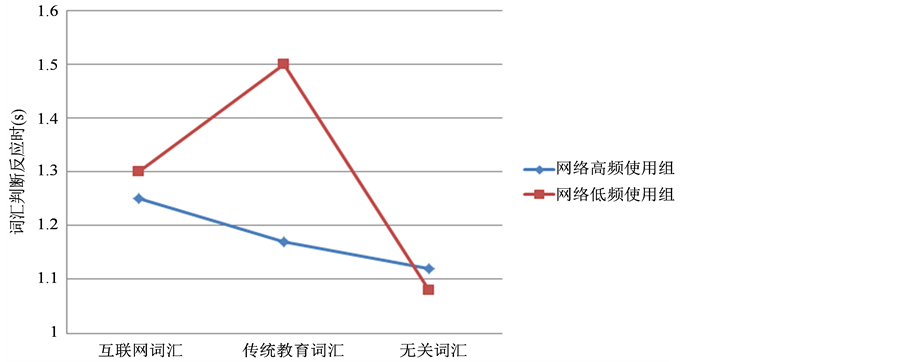1. 引言
由于传统认知科学以计算隐喻为核心假设的范式不能克服离身心智的根本缺陷,认知科学面临着范式转化,具身认知(Embodied Cognition)作为一种新的研究进路和纲领广受关注。具身认知扩展了参与认知活动的主体范围,摈弃了离身心智所认为的“身体只是一个物理载体”的观点,认为认知是“身体–主体”在实时的环境中的相互作用活动( 叶浩生,2010,2013,2014;李其维,2008 ; 李恒威&盛晓明,2006 ; 李恒威&肖家燕,2006 ),将认知活动的参与主体从“脖子以上”的大脑扩展到整个身体。在目前国外研究具身认知的观点流派中,延展认知(Extended Cognition)比较引人注目 (黄侃,2012) 。
延展认知是具身认知框架下的一种较为激进的观点,属于认知外在主义的进路,是一种尝试综合具身认知各种不同范式的新思路 (刘晓力,2010,2013) 。延展认知主义的观点认为认知是大脑、身体和世界之间的相互作用形成的。延展认知主义的代表人物克拉克 (Clark, 1999, 2013) 认为“认知过程的发生并不局限于在皮肤或者颅骨的边界之内”。人的认知过程,由于认知目标的要求,发展了认知能力,认知既是身体的认知受身体限制(Embodied),同时又是嵌入在外界环境之中的(Embedded) (Clark, 2008) ,为了完成任务所发展的认知能力必须将外部世界的工具纳入到认知系统中。
认知论近年来获得广泛关注,离不开互联网、手机此类工具对个体生活的影响。Nathaniel Barr (2015)就认为手机就是“口袋里的大脑”,甚至还有相对于iPhone,iPad而产生的新的自我概念iSelf (Russell B. Clayton, 2015),当然这些移动平台之所以能对我们的认知产生影响,其背后的基础还是互联网。目前互联网的广泛应用,以及从日常经验可观察到的互联网对于人类生活的深刻影响,使通过研究以互联网为工具并进一步参与到认知过程来探讨延展认知已成为可能。对互联网的心理学研究早期关注使用动机、社会联系,之后开始关注自尊、幸福感。近年,越来越多的学者开始关注互联网对认知策略的影响。作为外部交互记忆的互联网已成为学习的主要途径,同时延展认知将当前以互联网为媒介的重要学习活动纳入了认知范畴,认为互联网作为人的外部交互记忆以外部世界工具的角色参与到认知活动中,与人的大脑的活动进行耦合,为我们认识人与互联网的新型学习活动提供了重要的理论基础。
1.1. 被试以STROOP变式任务为范式探测问题解决策略的形成
Sparrow等人(2011) 在Science杂志提出了另一个比较经典的STROOP变式任务——“词语概念–颜色判断”STROOP变式任务(以下简称STROOP变式任务)。研究表明了被试在面临困难问题时会首先想到互联网概念,例如Google等词汇,这种结果甚至被称为“Google效应”。其原理为,通过对于特定词语的颜色判断反应时进行考察,就可以探测出该刺激词语是否进入到认知加工过程中,也就是被试是否想到了该词语。如果刺激词语进入到认知加工过程中就会占据认知资源,从而造成可用认知资源减少,会导致词汇颜色判断加工任务变慢;反之,则加快。在Sparrow等人的实验中,由于不具备经典STROOP任务中“刺激–刺激”维度的“词义–颜色”冲突所产生的认知负荷,所以在每次的颜色判断测试前,要求被试记忆一个6位数字以此增加认知负荷。此研究范式为考察词语是否进入认知加工过程提供了有效的研究途径,因此,在本研究中将借用Sparrow等人的STROOP任务变式来探测在不同问题难度下,被试形成何种解决策略,因为策略的形成可以通过词语是否进入到被试的认知加工过程来判断。
1.2. 本研究的假设
本研究假设,在面对容易问题时,被试对于随后的词汇颜色判断反应时不会出现延迟现象;在面对困难问题时,互联网或者传统教育的词汇反应时要变长;具体可再细分为,互联网的高频使用者对于互联网词汇的颜色判断反应时显著变长;与此相对应的,互联网低频使用者对于传统教育词汇的反应时显著比其他两类词汇要长。无关词汇与问题本身毫不相关,因此不会进入到认知加工过程中,因此在各种不同的实验条件下无关词汇的颜色判断反应时不会出现快慢变化。
2. 方法
2.1. 被试
中国东西部地区互联网应用环境成熟程度不同。在被试选择阶段,本研究通过互联网使用情况问卷获得了被试互联网使用的频度信息,用以区分和验证互联网高频和低频使用者。根据问卷数据,从中国东部地区苏州市两所大学中选取38名全日制本科大学生作为网络高频使用组被试,其中男生26人,女生12人;从中国西部地区拉萨师专选取20名全日制本科大学生作为网络低频使用组被试,男生7人,女生13人。被试年龄从19岁到24岁(M = 21,SD = 0.72)。被试身心健康,均为右利手,均无色盲、色弱等色觉视力障碍,视力正常或矫正正常。完成试验后被试均获取适量报酬。
2.2. 实验设计
采用2 (网络高频使用、网络低频使用) × 2 (容易问题、困难问题) × 3 (互联网概念词汇,传统教育概念词汇,一般概念词汇)的混合实验设计。高低频分组为被试间设计,问题难度和词汇分组为被试内设计。因变量为反应时和正确率。
2.3. 实验仪器和材料
实验材料中的难易两组问题的区分,是通过预先选择20名在校大学生对于全部32个问题的难易程度使用7点量表进行效价评定,经统计,困难问题组平均得分5.78,容易问题组平均得分2.33。两组得分差异显著,F(1,19) = 1.60,p < 0.001。
STROOP变式任务中需要被试进行颜色判断的词汇分为三组,即互联网词汇、传统教育词汇以及无关词汇。
2.4. 实验程序
实验采用计算机呈现刺激和问题,反应装置为键盘。用PsychoPy软件(版本v1.80.03)编制实验程序,反应时和正确率均由计算机自动记录。刺激呈现在计算机屏幕的正中央,被试距离屏幕的距离约为50厘米。在亮度一致的实验室里单独参加实验。为了防止被试猜测实验意图,被试均被告知本实验的目的是测试记忆力。
实验分为两部分,并且两个部分的程序相同:先回答16个随机出现的问题,随后进行三组共计15个词汇的颜色判断,词汇随机出现。实验顺序采用ABBA设计,一组被试先进行简单问题组的实验,再进行困难问题组,另一组被试先进行困难问题组再进行简单问题组的实验。
每一个部分开始时,首先出现欢迎语和指导语,向被试说明如何进行按键操作。被试完全明白了如何进行操作以后按空格键开始回答问题。需要回答的问题和答案都以黑色字体呈现在屏幕正中央,被试通过按键对问题的答案进行选择反应,答案为“是”按数字键“1”,答案为“否”按数字键“9”。回答完16个问题以后,开始STROOP变式任务,具体步骤为:屏幕呈现后续步骤操作说明的指导语,以及一个关于6位数字记忆与再认,被试有3秒的时间记住这些数字,紧接着出现一个词汇,词汇随机选自互联网概念词汇组,传统教育概念词汇组和一般无关词汇组中。词汇显示为红色或者蓝色,被试需要对于词汇的颜色进行判断,如果词汇为红色按数字“1”键,蓝色则按数字“9”键。按键进行颜色判断后,要求被试以再认之前出现的6位数数字。以上任务不断重复,直到所有三组词汇材料中所有词汇都随机出现并完成颜色判断以后自动结束。从在所有的环节中,被试需要在保证正确的情况下尽快按键。
实验后对于被试的访谈发现,即使鼓励被试进行猜测,也几乎没有被试能说出本实验的目的,大部分的被试认为此实验是一个关于记忆能力的实验,保证了本研究的有效性。
本研究采用SPSS软件(版本21.0)对数据进行统计处理。
3. 结果
首先,根据实验之前的问卷测试结果,两组被试互联网使用频度和使用互联网的历史信息见表1。对互联网使用频度进行独立样本t检验,结果表明组间差异显著,t(57) = −51.06,p < 0.001。在本研究中,被试每天的互联网使用小时数是其网络使用频度的主要指标。在收集被试使用互联网的行为信息时,我们发现网络使用高低频两组被试,在使用互联网的历史方面也很不一样,对被试使用互联网历史长度进行独立样本t检验,结果组间差异显著,t(57) = −45.31,p < 0.001。其次,因任务简单,所有被试的正确率都在95%以上。
本研究主要通过检验分析被试的颜色判断反应时数据来探测相应词汇是否进入到认知加工过程。对于问题难易程度、互联网使用频度分组以及词汇分组三个自变量,以词汇颜色判断反应时为因变量,通过多因素方差分析,结果显示,互联网使用频度、问题难易程度以及词汇类别三个自变量之间的交互作用显著,F(2,36) = 5.15,p < 0.01。
进一步简单效应分析表明,回答容易问题以后,互联网高低频使用组全部被试对于三组词汇进行颜色判断的反应时差异不显著,F(2,36) = 1.031,p > 0.05。互联网高频使用组被试之间差异不显著,F(2,36) = 1.405,p > 0.05。互联网低频使用组被试之间差异也不显著,F(2,36) = 0.355,p > 0.05。以上结果说明在容易问题条件下,没有任何特定词语进入到认知加工过程中,被试没有启用任何词汇概念。
数据如表2所示,同样经过简单效应分析表明,回答困难问题以后,互联网高低频使用组全部被试对于三组词汇的进行颜色判断的反应时之间差异显著,F(2,36) = 7.500,p < 0.01;进一步进行事后两两比较发现,互联网词汇组(M = 1.28)和传统教育词汇组(M = 1.31)的颜色判断反应时之间无差异,p > 0.05,但是这两组词汇的反应时要远远大于无关词汇的颜色判断反应时(M = 1.11),p < 0.01。
在回答困难问题条件下,通过区分互联网高低频使用组进一步进行简单效应分析,结果表明,互联网高频使用组被试的三组词汇颜色判断反应时之间差异显著,F(2,36) = 11.488,p < 0.001;继续进行事后两两比较发现,传统教育词汇组(M = 1.17)和无关词汇(M = 1.12)的颜色判断反应时差异不显著,p > 0.05。互联网词汇的颜色判断反应时(M = 1.25)显著比其他两组词汇的反应时长,p < 0.01。
如图1所示,互联网低频使用组被试对于三组词汇的进行颜色判断的反应时之间差异也非常显著,

Table 1. Internet use frequency and history (M ± SD)
表1. 互联网使用频度及使用历史(M ± SD)

Table 2. Reaction time of color judgment after answering questions (sec)
表2. 回答问题被试对于词汇的颜色判断反应时(秒)

Figure 1. Color-judging reaction time of low Internet use frequency after answering difficult questions
图1. 困难问题后低频使用组被试的颜色判断反应时
F(2,36) = 5.756,p < 0.01,继续进行事后两两比较发现,传统教育词汇组(M = 1.50)和无关词汇(M = 1.08)的颜色判断反应时之间的差异显著,p < 0.01,互联网词汇(M = 1.30)和无关词汇的颜色判断反应时之间的差异显著,p < 0.05。虽然传统教育词汇组和互联网词汇组之间的统计检验差异不显著,p > 0.05,但是从反应时来看,传统教育词汇组的反应时明显比互联网词汇要长。
4. 讨论
本研究从被试使用互联网的频度行为特征着手,研究这一行为特征对于被试获取信息解决问题方面的影响,而在此之前有关互联网对于此类问题未进行关注和探讨( Nasi & Koivusilta, 2013 ; Sparrow & Chatman, 2013 ; Sparrow et al., 2011 ),因而容易导致人们误认为只要会使用互联网就会依赖于互联网来解决问题。本研究的实验结果与研究假设基本一致。由于所处的地区经济发展状况不同,所在地区的互联网成熟和发展程度不同,因而影响到被试在使用互联网的行为特征方面的差异非常显著。在经济发达地区,互联网网络环境发展成熟,被试有更长的互联网使用历史和每天更长时间使用互联网的时间;在互联网软硬件条件不充分的地区,被试虽然会使用互联网,但是使用历史和每天的使用时间较少。
4.1. 无关词汇在所有实验条件下的反应时一致无变化
不论是互联网高频使用被试,还是低频使用被试,在容易问题和困难问题条件下,被试对于无关词汇的颜色判断反应时都基本一致,反应时无变化。这些数据证明了这些无关词汇没有在认知加工过程中启动,因此被试在遇到问题时不会想到这些词汇。其颜色判断反应时基本上就是被试针对颜色进行判断并进行按键反应输出的时间。
4.2. 面临容易问题时使用内部资源解决策略
以无关词汇的颜色判断反应时作为参考,通过对于全体被试的颜色判断反应时进行分析发现,在面临问题时,互联网词汇和传统教育词汇的反应时,相比较于无关词汇的反应时之间的差异显著,互联网词汇或者传统教育词汇进入到被试的认知加工过程中,从而占据了认知资源,并由于部分认知资源被占用而延缓了后续的颜色判断反应。一般无关词汇组因为与我们与实验中的问题毫不相关,因此,也没有进入到被试的认知加工过程中。
统计分析发现了被试在面临问题的时候,确实启动了不同问题解决策略。在回答容易问题后,互联网高频使用组和低频使用组的被试,互联网词汇、传统教育概念词汇以及一般词汇都没有进入其回答问题的认知加工过程,这说明对于比较容易的问题,被试可以通过自有知识来解决,即采用使用内部记忆提取答案的策略予以解决。这一发现和外国的研究有所不同。Sparrow等人的实验表明,虽然没有像在回答困难问题任务中表现的那么显著,但是被试在面临容易问题的时候也想到互联网概念,在统计检验上差异显著 (Sparrow et al., 2011) 。而在本研究中,互联网高低频两组所有被试在回答容易问题后,对于互联网词汇的颜色判断反应时间,相对于传统教育和无关词汇颜色判定反应时来说,确有轻微的延长,但是没有达到统计上显著的程度。这说明针对较为容易的问题,本研究中的中国大学生没有形成使用外部交互记忆资源的解决策略,而是通过本身的知识储备完成,这符合本研究的假设。因为中国学生普遍重视知识的记忆,在学习过程中教师也比较强调知识记忆和理解,相对于国外学生,中国学生对于一般的常识性问题都具备丰富的知识储备。
4.3. 困难问题条件下互联网使用频度影响不同问题解决策略的选用
回答困难问题以后,网络高频使用组的学生启动了互联网概念,表现为互联网词汇组的颜色判断反应时比传统教育词汇组以及无关词汇组要长,这一点与Sparrow等人的研究结果一致 (Sparrow et al., 2011) 。网络高频使用组的学生在面临自身知识欠缺情况下,马上通过寻求互联网帮助的问题解决策略。在这此情况下,互联网作为外部延伸的记忆,和内部记忆系统一样,可以给出即时的直接答案。互联网与认知过程,共同形成了一个实时动态的耦合系统,符合延展认知的观点( 任晓明&董云峰,2014 ; 刘革&吴庆麟,2012 ; 王变珍,2014 ; 黄侃,2012 )。值得注意的是,在困难问题条件下,互联网高频使用组被试的传统教育词汇颜色判断反应时与无关词汇的反应时非常接近,稍有一些微小的延长,这说明被试并非没有想到这些词汇,只是启用的程度非常低。
与互联网高频使用组学生形成鲜明对比的是互联网低频使用组的被试。该组被试在面临困难问题的时候,传统教育词汇组的颜色判定反应时长于互联网词汇的颜色判定反应时,但没有达到统计上的显著;传统教育词汇组和无关词汇的颜色判断反应时差异显著,这也反映出环境中的工具对于认知活动的影响。互联网使用低频组的学生即使在面临困难问题的时候更倾向于采用传统教育方式,即向老师和书本寻求帮助。上述情况说明了互联网的使用频度对于形成依赖互联网的问题解决策略有很大的影响。
在今天以互联网为典型的认知环境多样化的情形下,延展认知为我们重新理解认知和心智提供了一些值得思考的研究方案 (黄侃,2012) 。本研究结果为具身认知框架下的延展认知观点提供了部分佐证。认知过程是由情景建构、指导和支持的,个体的心理通常在情境中进行活动,而情景可以分为物质或任务方面、环境或生态方面以及社会或互动方面。该观点认为认知加工的性质取决于其所处的情景,不能脱离情景孤立的去研究,人类行为具有极大的可变性,不能脱离情景孤立地去研究 (刘革&吴庆麟,2012) 。虽然对于认知是否可以延展到环境中的观点还有争论,但是人们一般倾向于同意认知系统是延展的 (任晓明&董云峰,2014) ,本研究的观点建立在认知系统是可以延展到外界中这理论基础上。当前,互联网既构成了大学生所生活和学习的社会环境,同时互联网的各类应用和海量资源,又是这个社会环境中的基本工具,深度参与到大学生的日常活动中,因此可以看作是认知系统的一部分。
5. 结论
1) 人们在情景化的问题解决任务中,对于使用内部记忆知识就可以解决的问题,人们会立即调用这些大脑中的内部知识进行解决。
2) 对于那些因自身知识有欠缺而不能够回答的问题,会采用向外部资源求助的策略。具体采用哪种外部资源策略,取决于被试自身使用互联网的频度这一行为特征。高强度的互联网使用者倾向于立刻想到使用互联网来搜索答案,而互联网低频使用者尽管也会使用互联网,但是仍然倾向于请教师长,或者查询图书资料。
附录:容易问题和困难问题
容易问题
1) 恐龙已经灭绝了吗?
2) 《红楼梦》是曹雪芹写的吗?
3) 水的分子式是H¬¬2O?
4) 交通指示牌“停”一般是红色的吗?
5) 每天有24个小时?
6) 当前的中国国家主席是习近平?
7) 8加8等于16?
8) 孙中山是在北京去世的吗?
9) 氧气是一种金属吗?
10) 一年中有15个月吗?
11) 番茄酱是用西红柿做的吗?
12) 5加7等于30吗?
13) 《罗密欧与朱丽叶》是莎士比亚的作品吗?
14) 中国的国旗是红色吗?
15) 《水浒传》的作者是施耐庵吗?
16) 三角形是有三个边吗?
困难问题
1) 丹麦的国土面积要比哥斯达黎加大的多吗?
2) 本杰明富兰克林能够教钢琴课吗?
3) 意大利的扑克牌中有J吗?
4) 张艺谋是素食主义者吗?
5) 在二月份是不是比在其他月份更容易怀上孩子?
6) 全世界每个国家的国旗是否都至少有两种颜色?
7) 末代皇帝溥仪是在1911年退位的吗?
8) 氪元素的原子数是26个吗?
9) 人的眼睫毛的平均寿命是150天吗?
10) 庞贝是在公元前48年被朱利叶斯凯撒击败的吗?
11) 西方家族的姓氏是首先在罗马时代使用的吗?
12) 癫痫是一种神经疾病吗?
13) 在中国,姓李的人最多吗?
14) 昆虫能够感觉到饥饿吗?
15) 乾隆皇帝是从公元1736年到1796年在位吗?
16) 英文词“quince”是一种水果吗?